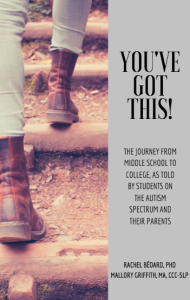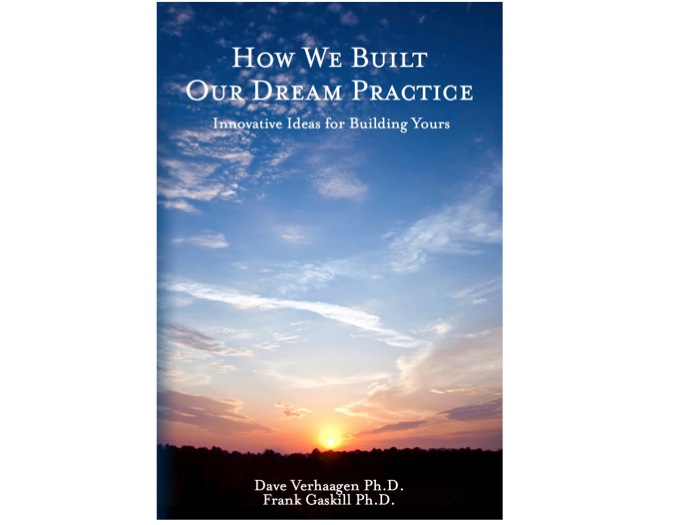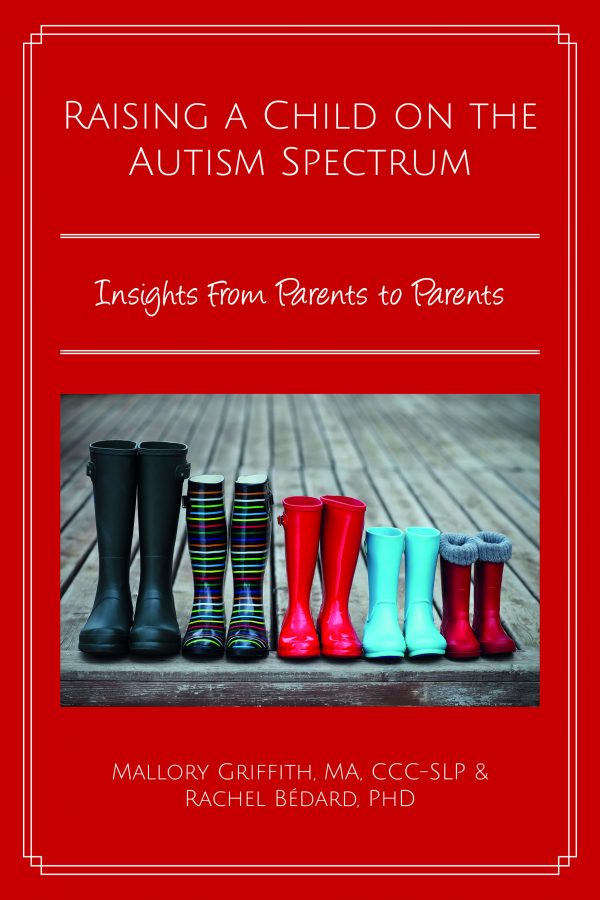Description
You've Got This! The Journey From Middle School to College, As Told By Students on the Autism Spectrum and Their Parents
By Rachel Bédard and Ph.D.Mallory Griffith, MA, CCC-SLP
Published by TPI Press
From the authors who brought you Raising a Child on the Autism Spectrum: Insights from Parents to Parents, this book takes the reader on a step-by-step sojourn into what many students and parents experience as rocky terrain – middle school, high school, college, and first jobs – regardless of whether they experience life through the autism spectrum lens. Rachel Bédard, PhD, and Mallory Griffith, MA, CCC-SLP, experts in treating families with ASD members, have tapped professionals, parents, and students to create the ultimate primer for managing “the unvarnished truth about academics, friendships, anxiety, and depression,” that students on the spectrum often encounter as they move into higher education and beyond.
From creating 504 plans to choosing colleges, the parents share their stories of frustration and perseverance. Theirs are heartfelt entries on the internal struggles of knowing when to let go and nurture their children’s self-advocacy. The young adult contributors with ASD invite the reader into their worlds and offer encouragement: Nick despaired over being bullied at school until “I was given a jetpack to fly out of it and up through the clouds above” after finding kind notes from classmates in his locker. Stephanie discovered her voice through writing and photography. Samuel ditched his dream of zookeeping. He’s now entrepreneur, author, and advocate for children with autism.
The personal stories in You’ve Got This! are scaffolded by advice from professionals in the field. Planning, flexibility, and outreach are among ingredients that predict a successful launch into these years. The students on the spectrum and their parents have got this. Let them be your guides.
Read an excerpt (click arrow to expand)[expand]
I Found “My People” in Middle School
By Luke
As a kid growing up, my life was fairly decent. I had a supportive mother with a good job, a steady income, and lived in a large house for the majority of my childhood. Sounds fantastic, right? Well, looking back, it really was. Unfortunately, the rest of my life was full of uncertainties, issues, and social confusion. When I was extremely young my sister was diagnosed with cancer. I didn’t realize the magnitude of this event until a few years ago. As such I have grown to respect my sister much more than I used to. My experience with autism has been “pleasant” at times and hellish at others. I will outline for you my experiences with school (hell) and then with video games and music (life changing).
School
Autism made my life a living hell from the moment I started school. I couldn’t seem to make any friends, I had horrid social skills, and I didn’t do my homework. But one thing people definitely noticed were my exceedingly high test scores. I always have been an intelligent individual, which is why I believe I hated my teachers and peers in elementary school. I always looked down on my peers because they seemed so immature to me.
Then, and even now, when I see boys “harassing” girls or guys for whatever reason, I think to myself, “How can they be so stupid and immature?” You may notice from my writing that I also have a lot of trouble keeping on one thought for very long. So, I often skip around on topics. My teachers nowadays are more open to my opinions.
Sometimes a person who goes out of her way can change your outlook on school. For me, this person was my middle school math teacher, Ms. Doe. I refused to do the homework the way she wanted, and showed her my way. She was the first teacher to look at my differing opinion and accept it. I always got the right answer, and she knew I didn't cheat, so she allowed me to do my work in my head for the most part on homework. I had no problem doing tests the way she wanted, due to their importance.
Thanks to Ms. Doe I really enjoy school now. I have learned how to argue my opinions and how to get my way diplomatically. I have never enjoyed doing things the way most people have done them. I am all about finding new and better ways of doing things. You could say that I found “my people” in middle school. I made friends with people like me. It was an interesting experience, meeting people who shared my problems. I enjoyed it, though, and made friends with several people, a few of with whom I am still friends to present day.
I think that in school, many teachers don’t enjoy dealing with kids with autism because they are “different.” I know it’s true, too. Just because nobody actually says it, doesn't mean it is false. I see why, I know some pretty annoying people (including myself) with autism. From my own experience, I think teachers should learn to accept these differing opinions, especially for grades K8/9. I have had practically no issues regarding this matter in high school.
Since day one my teachers have struggled with my motivation to change the way things are done. I always am arguing over something or another. I hated disagreeing with my peers, because instead of being open to criticism they always wanted to be correct all the time. So, I always argued with adults, for they were the only people who would listen to my argument with less prejudice. For some reason, I recently had a spontaneous change in my personality, acting in a more adult manner. Maybe this is related to some maturational changes in my brain. I observe that lately I have a more neutral view of the world, which has been helpful. I also realize this change in perspective took a lot of effort, although I wish the process of change wasn’t so hard.
Video Games
When I was 5, I got my first game -- Super Mario for the Super Nintendo. The same year, I made my first best friend, Pete. Things were looking up. Gaming changed my life for the better. Super Mario gave me a common interest with people, and made it easier to socialize via talking about the game.
Two or three years later I found myself struggling to relate to my peers again. My social skills in early elementary school were, frankly, terrible. I had a few friends, but I was never social with them. Once again, it was a game that changed my patterns. Around this time, I started playing Pokémon, and it changed my life forever: Pokémon gave me a group of friends when I didn’t have any. Gaming also taught me life lessons, such as working hard to accomplish your goals. It also helped me learn that if you want something you have to go get it, and not to expect it to just come to you.
Now I get to share what I really wanted to write about: anime and online multiplayer gaming. When I first started watching anime I had just lost a very close friend online. I also had lost my great grandmother. I was struggling in school as well. Anime gave me an escape into an alternate reality, where I could immerse myself in a better place than my own.
When I began playing online games regularly, I started playing with a clan named CTS. An online gaming clan is sort of like a club. We would get together and host streams, play various games, and sometimes just talk about life on the TeamSpeak server. I played a lot of League of Legends, and still do. League has a sort of code of conduct, which taught me how to be fair, and, above all else, taught me how to be humble in victory and kind in defeat. When I started playing League I made more friends in one year than in my entire life.
In more recent years I started playing Destiny (a multi-player, first-person game). Destiny has given me the opportunity to build teamwork skills, due to the extreme necessity of coordination and teamwork in the game. I have made many friends on Destiny. Due to personal experiences, I am led to believe that a vast majority of teenagers with autism turn to gaming as a coping strategy. I have met four other people with autism on Destiny alone, and the grand total of people with autism I have met online lies somewhere in the low hundreds. It has been a delightful experience talking with others like me, people who turned to gaming to solve social scenarios, or to just distract themselves from the day-to-day.
Music
Another of lifelong passion of mine is music. Music has always calmed my nerves in ways nothing else could. In all its many forms, music has become a major part of my life. Sometimes when I am having an off day, all it takes to feel better is to listen to some music [I prefer Japanese music]. When I was younger, I used to listen to music to calm down after a breakdown. Now it has the same effect, but I can completely avoid breakdowns just by listening to music. It really has a remarkable effect. When I listen to my Japanese music it is extremely calming. My breathing slows, and I become relaxed to a point of having no worries for a little while.
Advice to Parents
My advice to parents would be to be patient, be supportive, and do as much as possible to keep your children interested in school. Find your child’s passions. Use video games to develop social skills. Finally, live for the day when they grow up and things just “click.” Eventually everyone grows up. Even though it sure took a while, I did. [/expand]
Table of contents (click arrow to expand)[expand]
Acknowledgments
Introduction
Step I: Paving the Path From Middle School to Adulthood
Chapter 1. An ASD Diagnosis Has an Impact: Moving from Parental Advocacy to Self-advocacy
- Life is good - Quincy's mother
- Tears and more tears - Gordon's mother
- My side of the story - Sarah
- Professional Wisdom - Teresa Bolick, Ph.D.
Chapter 2. Middle School and High School: The Social Aspects
- The Autism Car – Zeke’s Mother
- The World of Nick – Nick and his Mother
- I Found “My People” in Middle School -- Luke
- Professional Wisdom -- Eric Straumanis, MD
Chapter 3. Middle/High School Academics: We Are Here to Learn, Right?!
- Academics -- Jake
- How I Learned to Learn -- Samuel
- Professional Wisdom -- Carisa Clinton, BS
Step 2: Choosing a College, Managing Your Team, and Graduating In One Piece
Which College is the Right College?
- Stepping over Roadblocks – Samuel’s Mother
- Dreaming Big -- Erik’s Mother
- There and Back Again -- Anthony
- Professional Wisdom --Amy Radochonski, MEd, Stephanie Martin, MA, Mallory Griffith MA, CCC-SLP, and Rachel Bédard, PhD.
Chapter 5. College Life on the Spectrum
- Hot and Cold: A College Experience -- Jordan
- Building the Puzzle of Life, with Autism-Shaped Pieces -- Taylor
- College is a Balancing Act -- Landry
- Professional Wisdom -- Julia Kothe, MEd, BS, BA.
Chapter 6. Resources for College and Beyond
- What I Wish I had Known – Sarah’s Mother
- Mentorship Makes a Difference -- Skyler
- Professional Wisdom - Amy Radochonski, MEd.
Step 3: Welcome to Adulthood. Now Get a Job!
Chapter 7. Landing a Job
- The Truth Within the Answer -- Jonathan
- The Keys to Success -- Dakota
- Forging a Different Path -- Stephanie
- Professional Wisdom -- Frank Gaskill, PhD
Chapter 8. The Importance of Passion and Being Understood
- The Silent Piano – Allison
- Car Ride -- Greta
- Professional Wisdom -- Aaron Meng, MD
Parting Words
Contributors to Professional Wisdom
References
Appendix [/expand]
About the authors
 Mallory Griffith, MA, CCC-SLP, is a speech-language therapist who focuses on coaching social communication skills in her private practice. She is the founder of the nonprofit, SOCIAL! The Pendley Project, which supports people with social and sensory-based needs through meaningful, daily activities. Mallory is profoundly grateful for clients who provide inspiration and colleagues who kindly support her endeavors. She is particularly thankful for Dr. Bédard’s patient mentorship and friendship. Mallory resides and works in Fort Collins, Colorado. Mallory Griffith, MA, CCC-SLP, is a speech-language therapist who focuses on coaching social communication skills in her private practice. She is the founder of the nonprofit, SOCIAL! The Pendley Project, which supports people with social and sensory-based needs through meaningful, daily activities. Mallory is profoundly grateful for clients who provide inspiration and colleagues who kindly support her endeavors. She is particularly thankful for Dr. Bédard’s patient mentorship and friendship. Mallory resides and works in Fort Collins, Colorado. |
 Rachel Bédard, PhD, is a licensed psychologist living and working in Fort Collins, Colorado. Known for her quick wit and dry humor, Dr. Bédard can seemingly find strengths in any situation and guide her fantastic clients to their own version of success. She thanks the many individuals who have allowed her to learn from their life experiences. This book would not have been possible without the inspiration of clients and mentors. Rachel Bédard, PhD, is a licensed psychologist living and working in Fort Collins, Colorado. Known for her quick wit and dry humor, Dr. Bédard can seemingly find strengths in any situation and guide her fantastic clients to their own version of success. She thanks the many individuals who have allowed her to learn from their life experiences. This book would not have been possible without the inspiration of clients and mentors. |
Are you considering this book for a class you are teaching?
Request a review copy. Download the request form and email it as an attachment to jeffzimmermanphdATthepracticeinstitute.com.




